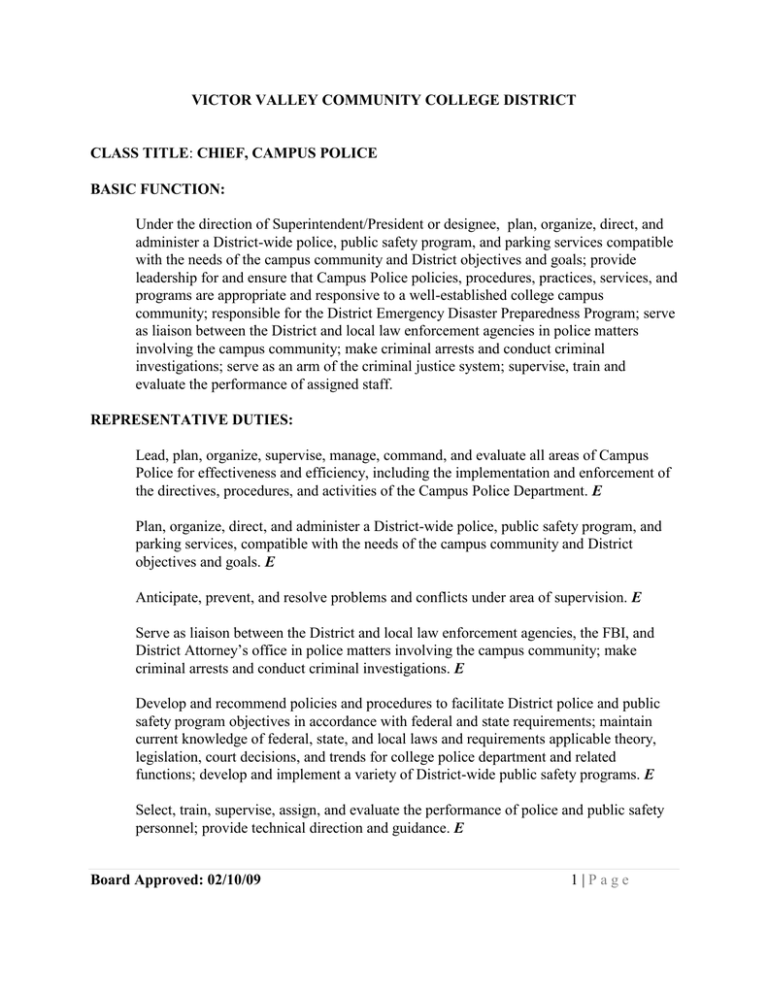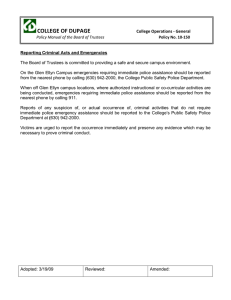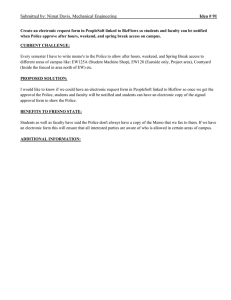VICTOR VALLEY COMMUNITY COLLEGE DISTRICT CLASS TITLE BASIC FUNCTION:
advertisement

VICTOR VALLEY COMMUNITY COLLEGE DISTRICT CLASS TITLE: CHIEF, CAMPUS POLICE BASIC FUNCTION: Under the direction of Superintendent/President or designee, plan, organize, direct, and administer a District-wide police, public safety program, and parking services compatible with the needs of the campus community and District objectives and goals; provide leadership for and ensure that Campus Police policies, procedures, practices, services, and programs are appropriate and responsive to a well-established college campus community; responsible for the District Emergency Disaster Preparedness Program; serve as liaison between the District and local law enforcement agencies in police matters involving the campus community; make criminal arrests and conduct criminal investigations; serve as an arm of the criminal justice system; supervise, train and evaluate the performance of assigned staff. REPRESENTATIVE DUTIES: Lead, plan, organize, supervise, manage, command, and evaluate all areas of Campus Police for effectiveness and efficiency, including the implementation and enforcement of the directives, procedures, and activities of the Campus Police Department. E Plan, organize, direct, and administer a District-wide police, public safety program, and parking services, compatible with the needs of the campus community and District objectives and goals. E Anticipate, prevent, and resolve problems and conflicts under area of supervision. E Serve as liaison between the District and local law enforcement agencies, the FBI, and District Attorney’s office in police matters involving the campus community; make criminal arrests and conduct criminal investigations. E Develop and recommend policies and procedures to facilitate District police and public safety program objectives in accordance with federal and state requirements; maintain current knowledge of federal, state, and local laws and requirements applicable theory, legislation, court decisions, and trends for college police department and related functions; develop and implement a variety of District-wide public safety programs. E Select, train, supervise, assign, and evaluate the performance of police and public safety personnel; provide technical direction and guidance. E Board Approved: 02/10/09 1|Page Chief, Campus Police-Continued Plan, implement and administer an on-going program of continuous campus-wide surveillance assuring the protection of lives and property; advise students regarding restraining orders and implement procedures necessary for enforcing restraining orders. E Inform District administration of security and safety problems as they arise and propose solutions as required; advise appropriate administrator of student discipline matters and prepare necessary reports; interview and inform involved students of discipline matters. E Develop, monitor accounts for, and maintain Campus Police-related revenue sources; prepare and monitor security program budget; prepare and maintain appropriate fiscal and operating records; prepare a variety of other records and reports as required to assure the accountability of District security services. E Plan, organize, direct, and administer a district wide plan to provide parking accommodations for faculty, staff, students, visitors, and guests of the district; enforce traffic laws and issue citations.E Serve as a member of various committees and other groups as needed to facilitate and promote District security services. E Assist health personnel with public health problems and services and coordinate District security services; deliver/serve confidential district documents as required. E Plan, organize, direct and administer the District Emergency Disaster Preparedness Program, in cooperation with assigned departments. E Perform related duties as assigned. KNOWLEDGE AND ABILITIES: KNOWLEDGE OF: District-wide police, public safety programs, and parking services goals and objectives. Policies and procedures to facilitate District police and public safety objectives. Methods, practices, and procedures necessary to prepare, monitor, and maintain police and public safety program budget and appropriate fiscal records/reports. Law enforcement legal mandates and practices such as P.O.S.T. standards (Peace Officer Standards and Training). Laws relating to youth, juveniles, and college students and laws pertaining to school, college, and university mandated crime reporting. Penal and Civil law. Proper techniques for evidence gathering, handling, documentation, and preservation. Board Approved: 02/10/09 2|Page Chief Campus Police-Continued Techniques used for conducting a criminal investigation. District organization, operations, policies, and objectives. Principles and practices of administration, supervision, and training. Record keeping techniques. Oral and written communication skills. Personal computer software operations and data entry techniques. Current legislation and regulations appropriate to a college police department. ABILITY TO: Plan, develop, assess, improve, organize, direct, and administer District-wide police and public safety program assuring protection of lives and property. Serve as liaison between District local law enforcement agencies, the FBI, and District Attorney’s office in police matters involving the campus community. Train, supervise, and evaluate assigned staff, police, and public safety personnel. Make criminal arrests and conduct criminal investigations. Plan, organize, direct, and administer district wide plan to provide parking accommodations for faculty, staff, students, and visitors. Plan, organize, direct, and administer district wide emergency disaster preparedness program. Cope with law violation, situations, and suspects. Gather, handle, document, and preserve evidence. Prepare, monitor, and maintain security program budget. Prepare a variety of reports and records required to assure accountability of District security needs. Communicate effectively with others both verbally and in writing. Exercise initiative and independent judgment. Work variable hours, including evenings and weekends, as needed. Operate a personal computer to enter data, maintain records, and generate reports. Maintain current knowledge of program rules, regulations, requirements, and restrictions. Analyze situations accurately and adopt an effective course of action. Read, interpret, understand, apply, and explain rules, regulations, policies, and procedures. Observe health and safety regulations. Establish and maintain cooperative and effective working relationships with others, including those from diverse academic, socioeconomic, cultural, ethnic, and disability backgrounds. EDUCATION AND EXPERIENCE: Any combination equivalent to: master’s degree and four years of experience as a peace officer; OR bachelor’s degree and six years experience as a peace officer; OR associate’s degree and nine years of experience as a peace officer; OR forty five semester units from an accredited institution and nine years of experience as a peace officer plus forty five California Post approved training points; OR thirty semester units from an accredited institution and twelve years of experience as a peace officer plus thirty California Post Board Approved: 02/10/09 3|Page Chief Campus Police-Continued approved training points; must be supplemented by a minimum of five (5) years experience directly supervising law enforcement and must meet the requirements of government code 1031. LICENSES AND OTHER REQUIREMENTS: Completion of School Peace Officer Course 832.3 within one year from date employment commences. Valid California Driver’s License. Valid First Aid Certificate and CPR Certificate issued by an authorized agency. Possession of either a POST supervisory or management certificate. A polygraph test may be required. WORKING CONDITIONS: ENVIRONMENT: Office, indoor, and outdoor environment. Driving from site to site to conduct work. Adverse weather conditions. PHYSICAL ABILITIES: Heavy lifting (over 50 pounds). Standing and walking for extended periods of time. Climbing, bending at the waist, crawling, kneeling, reaching, pulling, pushing, and carrying. Climbing ladders. Manual dexterity to operate computer keyboard, and other equipment. Seeing to observe. HAZARDS: Works as a first respondent to all emergency events on campus; including fire, unruly individuals, earthquake damaged areas, etc. Board Approved: 02/10/09 4|Page

